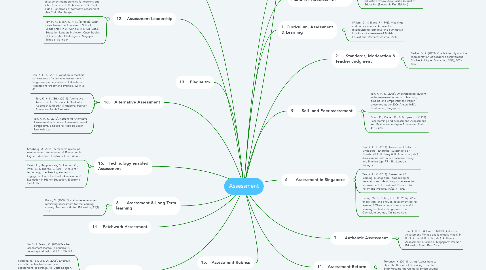Assessment
by Ad Rella

1. 4. Summative and Formative Assessment
1.1. Harlen, W. (2006). On the relationship between assessment for formative and summative purposes. In J. Gardner (Ed.), Assessment and Learning. London: SAGE Publications Ltd.
2. 8. Assessment & Long Term learning
2.1. Boud, D. (2000). Sustainable assessment: rethinking assessment for the learning society. Studies in Higher Education, 22(2), 151.
3. 10. Power & Assessment
3.1. Tan, K. H. K. (2004). Does student self-assessment empower or discipline students? Assessment & Evaluation in Higher Education, 29(6), 651 - 662.
3.2. Reynolds, M., & Trehan, K. (2000). Assessment: A critical perspective. Studies in Higher Education, 25(3), 267 - 278.
4. 12. Assessment Leadership
4.1. Stiggins, R. (2010). Essential formative assessment competencies for teachers and school leaders. In H. Andrade & G. Cizek (Eds.), Handbook of formative assessment. New York: Routledge.
4.2. Tay, H. Y., & Tan, K. H. K. (In Press). What does Assessment require of School Leadership? In B. Wong & P. T. Ng (Eds.), Education Leaders in Action: Case Studies of Leadership Challenges in Singapore Schools: Springer.
5. 13. Plagiarism
6. 14. Patchwork Assessment
7. 15. Assessment Rubrics
8. 16. Technology enabled Assessment
8.1. Stodberg, U. (2011). A research review of e-assessment. Assessment & Evaluation in Higher Education, Electronic First Edition.
8.2. Parkin, H., Hepplestone, S., Holden, G., Irwin, B., & Thorpe, L. (2011). A role for technology in enhancing students’ engagement with feedback. Assessment & Evaluation in Higher Education, Electronic First Edition.
9. 17. Assessment Literacy
9.1. Xu, Y. & Brown, G. (2016) Teacher assessment literacy in practice: A reconceptualization Vol 1, 149–162
9.2. Stiggins, R., & Duke, D. (2008). Effective instructional leadership requires assessment leadership. Phi Delta Kappan, 90(4), 285 - 291.
9.3. Willis, J., Adie, L. A., & Klenowski, V. (2013). Conceptualising teachers’ assessment literacies in an era of curriculum and assessment reform. Australian Educational Researcher, 40, 241–256.
10. 18. Alternative Assessment
10.1. Tan, K. H. K. (2013). Variation in teachers' conceptions of alternative assessment in Singapore primary schools. Educational Research for Policy and Practice, 12(1), 21 - 41.
10.2. Tan, K. H. K. (Ed.). (2011). Alternative Assessment in Schools: A Qualitative Approach (2nd ed.). Singapore: Pearson Education South East Asia.
10.3. Tan, K. H. K. (2010). Reframing Alternative Assessment in Schools: A research based perspective. Singapore: Pearson South East Asia Ltd.
11. 1. Curriculum, Assessment & Learning
11.1. Wiliam, D., & Black, P. (1996). Meanings and consequences: A basis for distinguishing formative and summative functions of assessment? British Educational Research Journal, 22(5).
12. 2. Standards, Moderation & Teacher Judgment
12.1. Sadler, D. R. (2009). Grade integrity and the representation of academic achievement. Studies in Higher Education, 34(7), 807 - 826.
13. 3. Meritocracy, Equity and Fairness in Assessment
13.1. Leonel Lim (2013): Meritocracy, elitism, and egalitarianism: a preliminary and provisional assessment of Singapore's primary education review, Asia Pacific Journal of Education (Electronic First Edition)
14. 5. Assessment Feedback
14.1. Hattie, J., & Timperley, H. (2007). The power of feedback. Review of Educational Research, 77(1), 81-112
14.2. Nicol, D., & Macfarlane-Dick, D. (2006). Formative assessment and self-regulated learning: A model and seven principles of good feedback practice. Studies in Higher Education, 31(2), 199 - 218.
15. 6. Assessment in Singapore
15.1. Tan, K. H. K. (2011). Assessment Reform in Singapore - Enduring, Sustainable or Threshold? In R. Berry & B. Adamson (Eds.), Assessment Reform in Education: Policy and Practice (pp. 75 - 88). London: Springer.
15.2. Tan, K. H. K. (2011). Assessment for learning in Singapore - Unpacking its meanings and identifying some areas for improvement. Educational Research for Policy and Practice, 10(2), 91-103.
15.3. Leong, W. S., & Tan, K. H. K. (2014). What (more) can, and should, assessment do for learning? Observations from ‘successful learning context’ in Singapore. The Curriculum Journal, Online edition.
16. 7. Authentic Assessment
16.1. Tan, K. H. K., & Lim, C. (2008). Authentic Assessment: What does it actually mean? In K. H. K. Tan & K. Koh (Eds.), Authentic Assessment in Schools. Singapore: Pearson Education South East Asia.
17. 9. Self- and Peer-assessment
17.1. Tan, K. H. K. (2006). Understanding student self-assessment in terms of learning, grading and empowerment. Paper presented at the 2006 Annual IAEA Conference, Singapore.
17.2. Boud, D., Cohen, R., & Sampson, J. (1999). Peer learning and assessment. Assessment and Evaluation in Higher Education, 24(4), 413 - 426.
18. 11. Assessment Reform
18.1. Torrance, H. (2011). Using Assessment to Drive the Reform of Schooling: Time to Stop Pursuing the Chimera? British Journal of Educational Studies, 59(4), 459 - 485.


